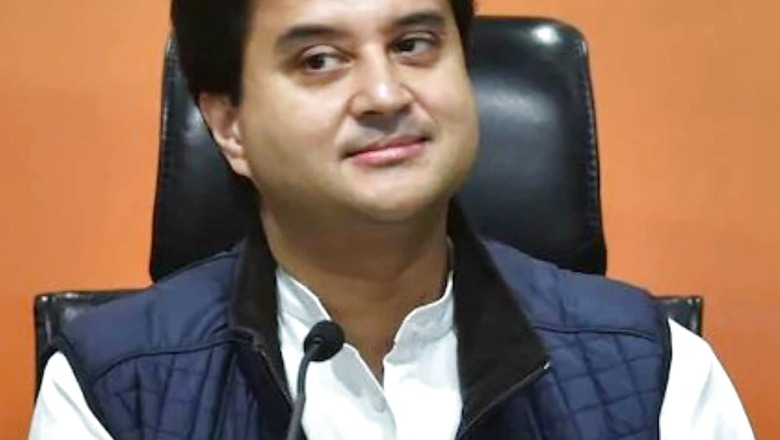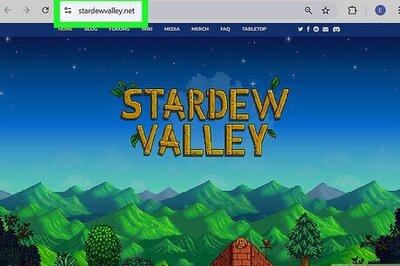
views
The Centre on Friday declared Tata Sons as the winning bidder to acquire debt-laden Air India with 100 per cent shareholding, marking the national carrier’s return to its founders after a gap of 68 years. Tata presented a winning bid of Rs 18,000 crore.
Civil aviation minister Jyotiraditya Scindia talks to CNN-News18 senior editor Pallavi Ghosh about what the Air India sale means for the central government and how it can boost the aviation sector in India. Excerpts from an interview:
Q. There is an emotional factor attached to the Air India sale. Was there any political pressure despite your decision to go ahead with it?
A. In the current state of affairs, there was a loss of Rs 20 crore per day to Air India, which is Rs 7,200 crore a year. This means, it was taking roughly Rs 35,000 crore to keep the airline going. Add to it equity infusion by the government of India and we are talking about lakhs of crores. It’s the responsibility of the government that it works efficiently. I am not the minister of Air India alone, I am not the minister of airports alone. I am the minister for customers, my ultimate stakeholder is my customer and, therefore, we need to take care of them. I wish the new owners all success. I think it’s a win-win situation for the stakeholders, the country and, under the leadership of PM (Narendra Modi), all ministries have come together to work to make this a success.
Q. Many are saying this is Nehruvian legacy, and that the sale should have happened earlier. But earlier attempts to sell Air India did not meet with success.
A. I have always said we will spend the rest of the day, next few days talking about the past, the legacy. I think we should live in the present and build into the future. The only comment in the present is that this is a transaction that has been widely applauded by every stakeholder, from industry to customers. And it was about time because the government cannot keep on spending money to keep the airline afloat when there are many more demands on such as social and infrastructural development. From the government’s point of view, customer and taxpayer point of view, this is a transaction waiting to happen. So you have many airlines and core capacity of many carriers. So as we slowly come out of Covid times, I hope this is one sector that will begin to do well and perform. This is why we are trying to put many proposals in place like trying to talk to states to bring ATF rates down and bring ATF under GST.
Q. There were other players, but Tata won. Why were they chosen?
A. The process was transparent. You had an EOI (expression of interest) that was put out. You had professionals who were guiding the process, you had bids that were being followed. You worked on reserve price and, based on that, financial bids were opened. Both bids were above reserve price and the best bid won.
Q. It’s not going to be easy for the Tatas. There is going to be a lot competition with Indigo, Vistara in the mix.
A. I don’t agree with this. Air India has 141 planes, you have reliabilities, but a massive number of assets. Routes, parking slots across the world and I think its up to the new management to make a success out of Air India.
Q. There is concern about existing employees of Air India. How will they be protected?
A. Look, there are safeguards in the transaction. Employees will not lose their job for one year. But if the new management wants to let some go, they will be given massive VRS benefits. Also, they can retain official residence for minimum of six months. There will also be an ESOP scheme. We will still guarantee them provident fund and convert it into ESOP. Also, all post-retirement medical facilities will be paid by the government of India.
Q. Some are calling the Air India sale as the ‘selling off of family jewels’. Could it not have been handled better? Couldn’t Air India have been made more profitable?
A. I want to tell those who are questioning the sale, would they be answerable to the taxpayer? Will you as a taxpayer support this? I think it’s about time the opposition looks at things from the nationalist point of view as opposed to an opposition point of view. And let me tell you, it’s also the opposition that was auguring for the ailing Air India. So I think it’s about time you don’t change your language depending on the seat you are sitting on.
Q. Does opting for divestment show that the government is reposing its faith in the private sector?
A. Obviously. Today, given the global environment, the government has to work with the private sector. This process signals to the world and not only our citizens that we are a collaborative government. We have to work together to make a success out of any policy to bring economic growth.
Q. Are we looking at that change in aviation sector where we will see a shift in emphasis from Mumbai-Kolkata-Delhi to say Gwalior-Sindhudurg?
A. You are absolutely bang on. What is the penetration of civil aviation today? We have 144 million flyers in a country of 1.3 billion people. Only 10 per cent people fly. We are only on the tip of the iceberg. We need to extend to the hinterland. We want to make the dream come true that those who wear hawai chappals can fly. We want a situation where people go by air where flights are cheaper than second class air-conditioned cars on the train. This is the PM’s dream.
Q. Flight fares are high. If more airlines come into play, can you assure that air fares will come down?
A. This has got to do with the market. As you know, globally, ATF fares are high. That’s why we are planning to talk to states and bring ATF under GST so that costs come down and fares are reasonable, and flying is accessible and affordable to hinterland and all people.
Read all the Latest News , Breaking News and IPL 2022 Live Updates here.



















Comments
0 comment